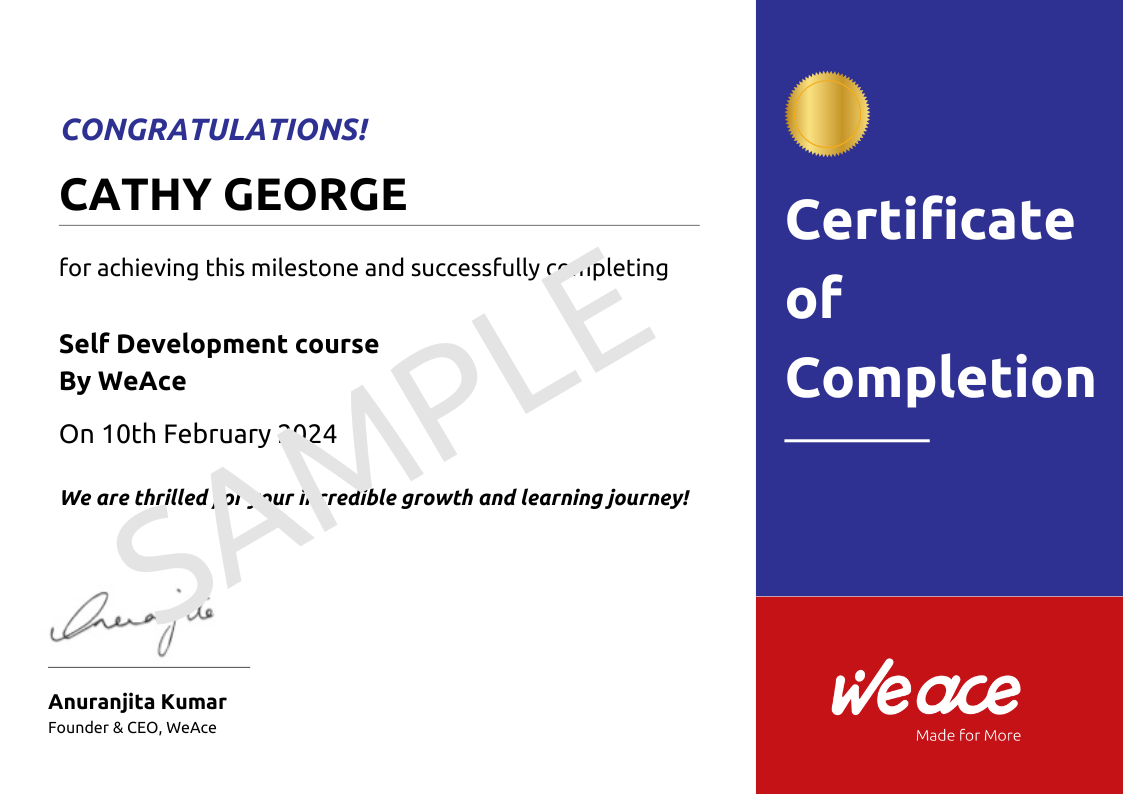Course Details
This is a half-day program for a batch size of 30 professionals.
A session on relationship building and sustaining offers numerous advantages for both personal and professional growth. Here’s a detailed look at why such a session is beneficial and what you can expect to gain from it:
1. Understanding Relationship Dynamics
- Foundations of Relationships: Learn the core principles that underpin successful personal and professional relationships.
- Types of Relationships: Understand the different types of relationships, including personal, professional, and social, and the unique dynamics of each.
2. Improving Communication Skills
- Effective Communication: Develop skills to communicate clearly, effectively, and empathetically.
- Active Listening: Learn techniques to listen actively, understand, and respond appropriately to others.
3. Building Trust and Credibility
- Trust-Building Techniques: Discover strategies to build and maintain trust in various types of relationships.
- Consistency and Reliability: Understand the importance of consistency and reliability in establishing credibility.
4. Enhancing Emotional Intelligence
- Self-Awareness: Increase your self-awareness and understanding of your own emotions and how they affect your interactions.
- Empathy: Cultivate empathy to better understand and relate to others’ emotions and perspectives.
5. Conflict Resolution
- Identifying Conflicts: Learn to identify potential conflicts early and understand their root causes.
- Conflict Resolution Techniques: Gain skills in resolving conflicts constructively and maintaining positive relationships.
6. Networking Skills
- Effective Networking: Learn how to network effectively, including initiating and sustaining professional connections.
- Building a Network: Strategies for building a diverse and supportive professional network.
7. Creating and Sustaining Professional Relationships
- Client and Customer Relations: Techniques for building and maintaining strong relationships with clients and customers.
- Colleague and Team Relationships: Strategies for fostering positive relationships with colleagues and team members.
8. Cultural Competence
- Understanding Diversity: Learn about the importance of cultural competence in building relationships across different backgrounds.
- Adapting Communication: Techniques for adapting your communication style to be more inclusive and respectful of cultural differences.
9. Mentoring and Coaching
- Role of Mentoring: Understand the benefits of mentoring and how to be an effective mentor.
- Coaching Techniques: Learn coaching techniques that help others grow while building a strong, supportive relationship.
10. Personal Development
- Personal Goals: Set personal goals for improving your relationship-building skills.
- Continuous Improvement: Develop a mindset of continuous improvement and lifelong learning in relationship management.
Conclusion
Attending a session on relationship building and sustaining equips you with the skills and knowledge to foster strong, lasting relationships in various aspects of your life. Whether you aim to improve personal connections, enhance professional relationships, or develop networking skills, such sessions offer valuable insights and practical tools for achieving your goals.
For more information on pricing and registration, contact [email protected]
Program Structure
1. Introduction and Orientation
- Welcome and Icebreaker Activities: Engage participants with activities to build rapport and create a comfortable learning environment.
- Program Overview: Introduction to the session’s goals, agenda, and expected outcomes.
- Setting Ground Rules: Establish guidelines for respectful communication and active participation.
2. Understanding Relationship Dynamics
- Foundations of Relationships: Explore the core principles that underpin successful personal and professional relationships.
- Types of Relationships: Discuss the different types of relationships, including personal, professional, and social, and their unique dynamics.
3. Communication Skills
- Effective Communication: Learn techniques for clear, effective, and empathetic communication.
- Active Listening: Practice active listening skills to better understand and respond to others.
- Nonverbal Communication: Understand the role of nonverbal cues in effective communication.
4. Building Trust and Credibility
- Trust-Building Techniques: Discover strategies to build and maintain trust in various relationships.
- Consistency and Reliability: Understand the importance of being consistent and reliable to establish credibility.
5. Enhancing Emotional Intelligence
- Self-Awareness: Increase self-awareness and understand how your emotions affect your interactions.
- Empathy Development: Cultivate empathy to better understand and relate to others' emotions and perspectives.
- Managing Emotions: Learn techniques for managing your emotions effectively in different situations.
6. Conflict Resolution
- Identifying Conflicts: Learn to identify potential conflicts early and understand their root causes.
- Conflict Resolution Techniques: Gain skills in resolving conflicts constructively while maintaining positive relationships.
- Role-Playing Exercises: Engage in role-playing scenarios to practice conflict resolution skills.
7. Networking Skills
- Effective Networking: Learn how to initiate, build, and sustain professional connections.
- Building a Network: Strategies for developing a diverse and supportive professional network.
- Maintaining Connections: Techniques for maintaining and nurturing professional relationships over time.
8. Creating and Sustaining Professional Relationships
- Client and Customer Relations: Techniques for building and maintaining strong relationships with clients and customers.
- Colleague and Team Relationships: Strategies for fostering positive relationships with colleagues and team members.
- Mentoring and Coaching: Understand the benefits of mentoring and coaching relationships and how to be an effective mentor or coach.
9. Cultural Competence
- Understanding Diversity: Learn about the importance of cultural competence in building relationships across different backgrounds.
- Adapting Communication: Techniques for adapting your communication style to be more inclusive and respectful of cultural differences.
10. Building Personal Relationships
- Family and Friends: Explore ways to strengthen and sustain personal relationships with family and friends.
- Work-Life Balance: Learn how to balance professional and personal relationships to ensure a healthy, fulfilling life.
11. Personal Development and Growth
- Setting Personal Goals: Help participants set personal goals for improving their relationship-building skills.
- Continuous Improvement: Develop a mindset of continuous improvement and lifelong learning in relationship management.
12. Action Planning and Follow-Up
- Personal Action Plan: Guide participants in creating a personal action plan to apply what they’ve learned in their own relationships.
- Follow-Up Activities: Provide suggestions for ongoing practice and development, such as reading materials, online courses, and peer support groups.
13. Evaluation and Feedback
- Participant Feedback: Collect feedback from participants to assess the effectiveness of the session and identify areas for improvement.
- Program Evaluation: Review the outcomes and impact of the program to ensure continuous improvement.
Additional Elements
- Guest Speakers: Invite experts in relationship management to share their insights and experiences.
- Resource Materials: Provide participants with handouts, books, and online resources for further learning.
- Certification: Offer a certificate of completion to participants who successfully complete the program.
Get your certificate of completion

-
DURATION 3 Hour(s)
-
LEVEL Entry Level (0-2 years), Junior Level (2-7 years), Mid Level (8-15 years)
-
FORMAT Online Instructor Led
-
CERTIFICATION Yes
-
Academy Leadership & Management
-
Topics Empathy, Relation Building
-
KEY LEARNING AREA Upskilling, Sustainability
-
SKILLS Relationship Building, Responsibility
-
BEST FOR Working Professionals
-
TRAINER WeAce

/filters:strip_exif()/wocademy/images/logo/CGbzDwyfOg0Y2G2256KaalFuhBUrSllJSLaZfzEq.png)
 Led
By: WeAce
Led
By: WeAce
 Online
Self
Paced
Online
Self
Paced
/filters:strip_exif()/wocademy/images/logo/UY9kBKDR3wAOYtJlGK8JXbNzoyNWNvJF4BS5aQ1R.png)
/filters:strip_exif()/wocademy/images/logo/2aF4M6uMTlZwynmACfiueOqxX1j40f97GC92b381.jpg)
/filters:strip_exif()/wocademy/images/logo/ZW6NL15u1XYiyGaWLE22SjcEPbdcLEe76QrskE8i.png)
/filters:strip_exif()/wocademy/images/logo/gsQTeglpz2nqoyusls9ZQTRocyQI2LLDlDgEv3Ie.jpg)
/filters:strip_exif()/wocademy/images/logo/l3qL3R1zRJ1puq9AI3RvSviw3lXbzi62r309bf1k.jpg)
/filters:strip_exif()/wocademy/images/logo/6rRI64gi7eBwuvKFU8XcGadGzMiQa3ceYCE7WgfX.jpg)
/filters:strip_exif()/wocademy/images/logo/P7EVM09VRk1BaZjfBVCy6VhpVWJE2iibRlOajnRW.jpg)